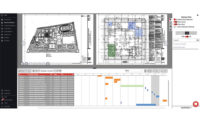Big data is like the Atlantic Ocean; it’s huge and deep and full of power but we know that—whatever we have done so far—we have barely touched its potential.
One example of tapping the potential of big data is a service that mines and analyzes the hits generated by more than one million mobile wireless devices as they register at one cell tower after another while traveling along. The identities of the users are never known, but it doesn’t matter. It is the pattern of movements on a grand scale that tells the tale.
The transportation studies the data analytics company, AirSage, can produce by drawing inferences from those “sightings” have attracted customers among transportation agencies, planners and developers who find the near real-time passive tracking of thousands of traveling devices can provide a very solid basis not only for management, but for anticipating trends and planning for the future.
One offshoot of those relationships with transportation professionals is a survey that AirSage has conducted for the last two years now, asking them for their thoughts about their profession, technology, the transportation sector, and its future.
This year they had 378 respondents; three times as many as the year before. Results are broken down by gender, age, type of business or government agency, job role and years of experience.
A question about new technology and data collection reveals heavy age-bias. Those admitting to being either “very skeptical” of new technology barely registered among the under 29 year-olds, 29 to 35-year olds, 36 to 43 and even 44 to 56 year olds, but those over 57 years old who declared themselves skeptical of new tech came in at 26.4%.
When the question was eased to ask if respondents only were “leery” of new technology, 9.2% of the 36 to 43 group joined the doubters, as did about 39% of their older colleagues in each of the next two categories.
But when the question was flipped to “strongly prefer new technology,” 83.8% of the youngest workers said yes, and 60% of the 29 to 35s, with the positives tapering rapidly from there.
In comments about the question, one in the younger cohort noted that most senior engineers did not have the training to clean and process big data, and therefore they were skeptical when they saw massive amounts of messy raw data. A comment from the 44 to 56 group noted that “technology developments are moving WAY faster” than acceptance and use, but on the other hand, one of the older workers cautioned that “Of course there are Luddites in all of the older categories, but if you are functioning at all in todays world you need to use technology.”
In another question category, though, the answers seem to suggest a bit of a backing away from the use of new technologies in the transportation sector:
-- In 2014, just over 11% of respondents considered their organizations to be “very cutting-edge.” That was down 4.3% from the previous year.
-- 8.2% considered their organizations to be “a pioneer,” down 1.8%.
-- 64.5% considered their organizations to be “sometimes traditional, sometimes progressive” which was 9% more than the previous year.
The respondents were 71.1% male. The number of responses was fairly evenly divided between the age groups at about 23% to 26%, with the exception that only 10.1% came from the youngest group, 18 to 28, and 16.1% from the workers 36 to 43 years of age.
The survey covers a good bit of additional ground beyond the application of technology to the sector, including asking for attitudes about the effects of government policies and politics. An AirSage report about the project can be seen here.



Post a comment to this article
Report Abusive Comment